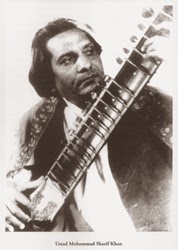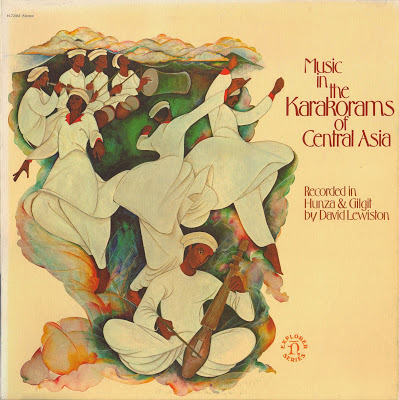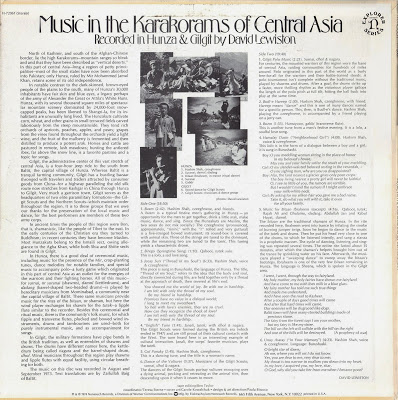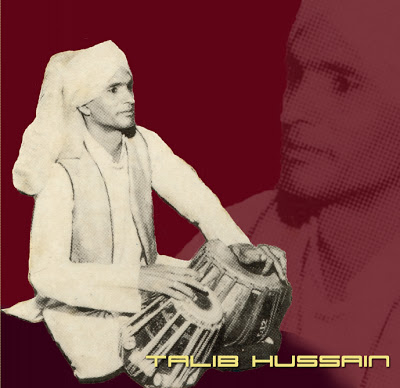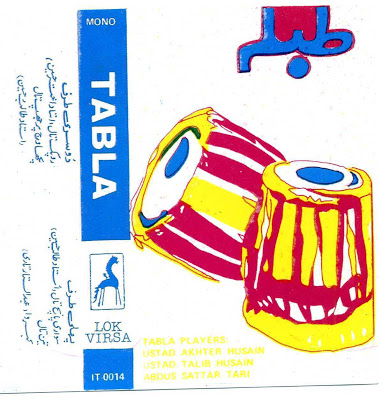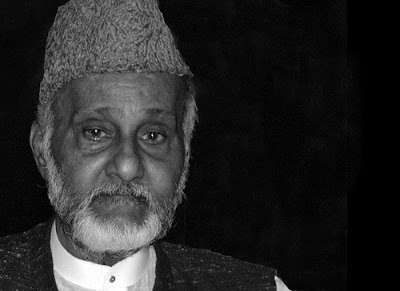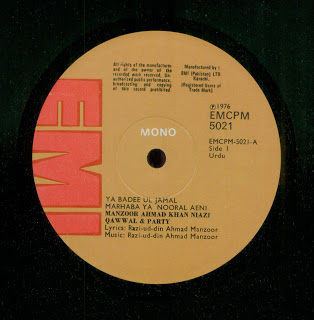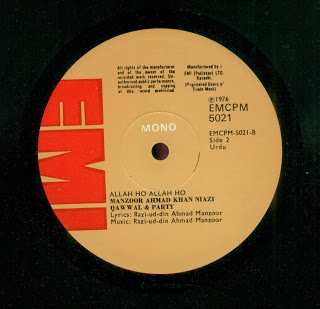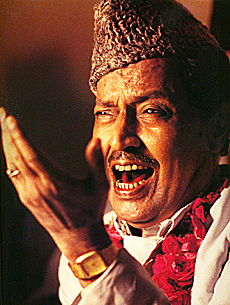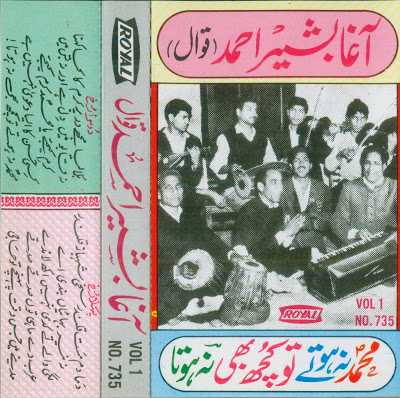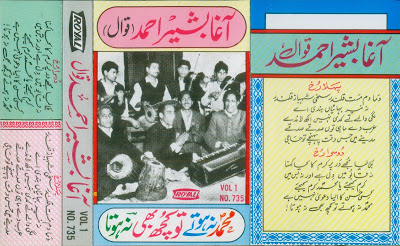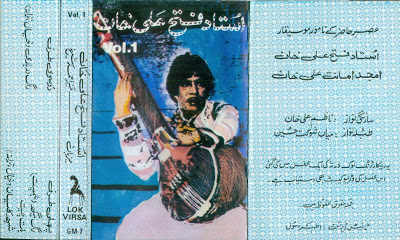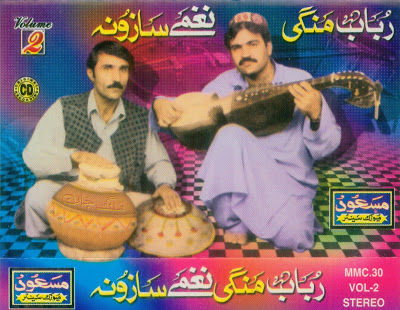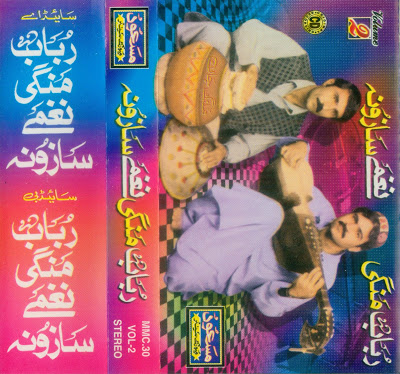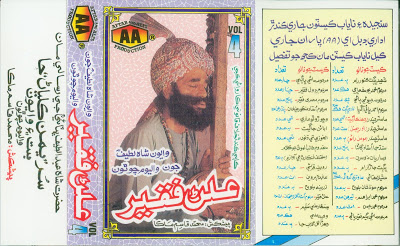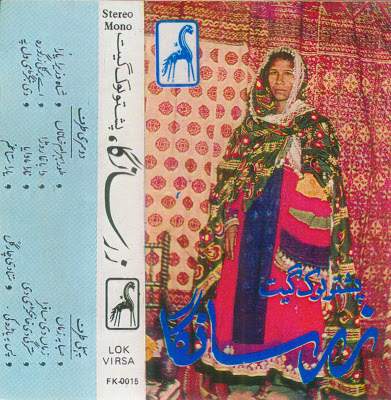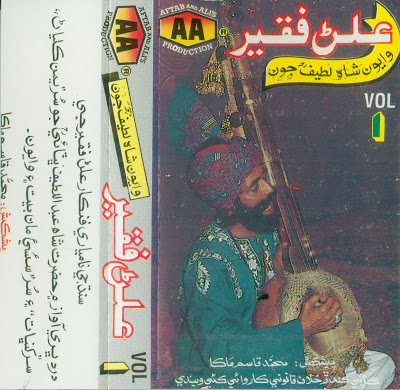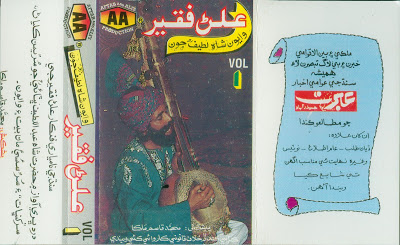Showing posts with label Pakistan. Show all posts
Showing posts with label Pakistan. Show all posts
Sunday, 22 March 2015
Friday, 20 March 2015
Gharanon Ki Gaiki - Vol. 5 - Roshan Ara Begum (1917-1982) - Vol. 1 - Kirana Gharana
Next come 4 cassettes by the Malka-e-Mausiqi (The Queen of Music) Roshan Ara Begum, legendary singer of the Kirana Gharana. See here our post of an LP from the eraly 1960s. There you find also more information about the artist.
Thursday, 19 March 2015
Wednesday, 18 March 2015
Tuesday, 17 March 2015
Monday, 16 March 2015
Gharanon Ki Gaiki - Schools of Music - Set of 20 cassettes published in 1978 in Pakistan
Over the next couple of weeks we will post the 20 cassettes from this wonderful box devoted to the vocal Gharanas existing in Pakistan. Many of the singers were amongst the greatest of their times, though some were hardly known outside some circles of connoisseurs. The singers were accompanied by equally great Sarangi and Tabla players. Just wonderful. I bought this box in the early 1980s in a Pakistani record shop in Southall near London.
Sunday, 11 May 2014
Mohammad Shareef Khan Poonchwale (1926-1980) - Some Vichitra Veena Recordings
As the great Sitar and Vichitra Veena master Ustad Mohammad Shareef Khan Poonchwale (1926-1980) has still not got the attention by music lovers he deserves and especially his mastery over the difficult and rare Vichitra Veena is very little known, we post here some recordings, orginally posted by Dr. Ashfaq Ali Khan (Holistic Khan) in his wonderful treasure troves on esnips and mediafire. The original folders don't seem to be available anymore in the internet. Earlier we posted the only Vichitra Veena LP by the artist here.
1. Raga Aimen (31:23)
2. Raga Darbari (18:16)
3. Pilu Thumri (13:05)
On the artist see our earlier posts:
and also:
http://www.thefridaytimes.com/15042011/page25.shtml
See also our earlier Vichitra Veena posts:
http://oriental-traditional-music.blogspot.de/search/label/Vichitra%20Veena
See also our earlier Vichitra Veena posts:
http://oriental-traditional-music.blogspot.de/search/label/Vichitra%20Veena
Friday, 15 November 2013
Music in the Karakorams of Central Asia - LP published in the US in 1974
See for more information:
Saturday, 4 May 2013
Talib Hussain (Tabla & Pakhawaj) and other Tablaiyas - Cassette from Pakistan
Ustad Talib Hussain was one of the major two or three Tabla players in Pakistan
from the 1960s to the 1990s and one of the last remaining Pakhawaj players of
Pakistan. He was well versed in both Tabla and Pakhawaj playing. He learned from his uncle Baba Malang Khan of Talwandi. Later on he further studied with Ustad
Gami Khan of Dehli Gharana. In
addition, he was the last recognized practitioner of the Punjab style of
Pakhawaj playing (from which the tabla gharana has its roots). Unfortunately, at
a relatively young age, Ustad Sahib was murdered in a mosque by militants in
Lahore in 1993.
We present here a cassette published in Peshawar, Pakistan.
We don't remember from whom we obtained this cassette and unfortunately we
didn't scan the original cover. These recordings are different from the ones published in 1974 on LP by EMI Pakistan and now available for download on many download platforms like Amazon, Musicload, emusic etc.
Bosmart just posted on his blog "La Logique interne" apparently the original version of this cassette:
The correct track info according to the cover below - posted by Bosmart - is, if we read it correctly:
Side A:
1. Savari Panch Tal by Ustad Talib Hussain
2. Tintal (Vilambit & Drut) by Abdul Sattar Tari (Tari Khan)
Side B:
1. Rupak Tal by Ustad Akhtar Hussain
2. Pakhawaj Jhaptal by Ustad Talib Hussain
The version which we copied many many years ago was from a cassette published by Ariana Recording in Peshawar. Unfortunately we didn't copy the cover and in the deciphering of the names of musicians we made either mistakes or the information given on this cassette was not correct. Anyway, the Ariana cassette seems to be a later copy of the original Lok Virsa cassette. We are very grateful to Bosmart to have posted the original version.
About Abdul Sattar Tari (Tari Khan) (born 1953):
There were two Tabla masters by the name of Akhtar Hussain, one of them being the last Khalifa of the Punjab Gharana. I guess here we have this Akhtar Hussain.
On the Punjab Gharana see:
Sunday, 28 April 2013
Manzoor Ahmad Khan Niazi Qawwal (1922-2013) and Party - Ya Badee Ul Jamal - EMCPM-5021 (1976) - EMI Pakistan
Ustad Manzoor Ahmad Khan Niazi
has passed away on April 9, 2013.
About the artist: http://www.qawwalniazi.com/index.html/#!?page_id=25
We had posted already in June 2011 this beautiful LP:
Side 1:
1. Marhaba Ya Noor al-Aeni (12:49)
2. Ya Badee Ul Jamal (11:34)
Side 2:
Allah Ho Allah Ho (23:37)
Tuesday, 19 February 2013
Bahauddin Qutbuddin Hamnava - Ya Habibi Ya Muhammad - Qawwali - Cassette from Pakistan
Ustad Bahauddin Qawwal (1934-2006) came from a family which traces its musically extremely rich lineage back to the Qawwal Bachche formed by Amir Khusrow (1253-1325). He received formal musical training from his father, Suleman Khan, and his
uncle, Sardar Khan, a legendary Khyal singer of Delhi Gharana. The Delhi Gharana of Tanras Khan is a branch of the Qawwal Bachche Gharana and in both there were many famous singers of classical Raga music and of Qawwali. For example the cousin of Bahauddin, Munshi Raziuddin, a very famous Qawwali singer, was the teacher of his nephew Naseeruddin Saami, an oustanding Khyal singer from Karachi and a cousin of Bahaudin, who used to live just opposite him in the same street.
In the 1950s and 1960s Bahauddin was, together with the legendary Munshi Raziuddin, part of the ensemble of Manzoor Ahmed Khan Niazi Qawwal of whom we had posted earlier an LP (see here). In 1965 Bahaudin formed with his brother Qutbuddin his own ensemble, as did also later Munshi Raziuddin Qawwal. These three ensembles were the great representatives of the old tradition of Qawwali. Today Munshi Raziuddin's son Farid Ayaz is the best one of those carrying on this tradtion.
The German musicologist, producer and festival organizer Peter Pannke brought Bahaudin Qutbuddin Qawwal several times to Germany and Europe. He also produced a CD by him and several beautiful compilations of Pakistani Sufi music like the double CD "Troubadoure Allahs", on which there are tracks by Bahauddin. These can be obtained from: info@raga-maqam-dastgah.com.
See more about Bahauddin in the links given below. Here we present a beautiful cassette from Pakistan. It seems that the name of Bahauddin is not correctly written on the cassette (Bahaddin) but its definitely him.
Side 1 (29:06)
Side 2 (29:18)
Many thanks again to Danny for sharing this cassette.
http://www.qawalbachchay.com/?page_id=34
http://en.wikipedia.org/wiki/Qawwal_Bahauddin_Khan
see also the excellent blog: http://qaul.blogspot.com/2008/05/1969-mehfil-qawwals-raziuddin-niazi.html
For good articles on Qawwali:
http://www.qawalbachchay.com/?page_id=16
http://www.qawwalniazi.com/#!?page_id=23
Sunday, 17 February 2013
Moulvi Ahmed Hassan Beranwale Qawwal & Party - Volume 2 - Cassette published in 1980 in UK
Wonderful Qawwali cassette I bought in the 1980s in Southall. The person on the picture is the senior member of the group and father of the singer Moulvi Ahmed Hassan Beranwale Qawwal. See article below.
Side A:
1. Ya Shah-e-Jillani Pa De Khair (10:34)
2. Dekha Ke Jhalak Tum Chup Hi Gaye (19:26)
Side B:
1. Music (5:06)
2. Yeh Sach Hai Deegar Nabion Se (24:37)
"Qawwali has been blessed with many unique voices. Some of them, like Nusrat's,
Munshi Raziuddin's or Ghulam Fareed Sabri's, are justifiably well known.
Others, like Murli Qawwal's, Mubarak Ali-Niaz Ali Qawwal's or Rasheed Ahmed
Fareedi Qawwal's , are probably not as widely acclaimed as they ought to be. One
of the most unique voices in Qawwali was that of Maulvi Ahmed Hassan Akhter
Bheranwale Qawwal. Emotive, raspy, mellifluous, with the ability to elicit tons
of feeling out of a few notes. He performed mainly in the '70s and 80's with his
father - who I'm 90% sure was named Maulvi Akhtar Hassan Qawwal, feel free to
correct me if I'm wrong - and his younger brother Maulvi Haider Hassan Qawwal,
who currently performs with the remaining members of his elder brother's Qawwali
party..
Maulvi Ahmed Hassan quit performing in the late 1980s, which is a
real shame because he had a voice and a performance style that was second to
none. Performing traditional sufi Kalam in Urdu and Farsi with the same verve
and vigour as his Punjabi performances, Maulvi Ahmed Hassan was a true
representative of the Punjabi school of Qawwali; imparting a distinctly earthy
feel to whatever he sang. The studio recordings he made for OSA are brilliant,
with my only gripe being the fact that the recordists didn't place a microphone
in front of Maulvi Akhter Hassan, with the result that we can barely hear the
senior Qawwal's voice in most of them."
Thursday, 14 February 2013
Agha Bashir Ahmad Qawwal - Vol. 1 - Qawwali - Cassette from Pakistan
Beautiful old style Qawwali. His full name: Agha Bashir Ahmad Faridi Qawwal.
Side A (30:27)
Side B (30:01)
Many thanks again to Danny who brought all these jewels from a trip to Pakistan many years ago.
Here some background information about the traditions he belonged to:
"Ustad Muhammad Ali Faridi Qawwal:
Ustad Muhammad Ali Faridi is a seminal
figure in the history of 20th Century Qawwali, influencing everything from how
it is performed to the position of the performers in a Qawwal party.
Incorporating Classical Sufi texts with the tradtional Doaba ang of Punjabi
gayeki, he created a potent style of Qawwali that proved popular both with the
discerning listeners and the masses. Although his recordings date from the mid
'30s to the late '60s, he started performing much earlier. Accompanied on his
latter recordings by his son Abdul Rahim Faridi, the Ustad displayed a unique
and very malleable voice that was very expressive in the upper registers and
displayed glimpses of his rather formidable classical training. His list of
shagirds includes giants like Agha Rasheed Ahmed Faridi and Agha Bashir Ahmed
Faridi along with his son Abdul Rahim Faridi, who in turn instructed modern
practitioners like Faiz Ali Faiz Qawwal. The Ustad's lineage continues through
his grandson Moeen Ali Faridi Qawwal.
Baba Din Muhammad Jalandhri
Qawwal:
When I wrote the earlier post on the Qawwals of the earlier half
of the 20th century, I added Din Muhammad Jalandhri almost as an afterthought,
because I didn't have any information about him that I could append to his
rather wonderful recording. Over time however, I have come to learn a great deal
about him and have come to realize his stature among the great Qawwals of the
early 20th century. Apart from having an amazingly robust and vociferous andaz,
Din Muhammad Qawwal, or Baba Deena Qawwal as the gentlemen over at Rehmat
Gramophone House call him, is the forbear of not one but TWO illustrious Qawwali
lineages. He was the uncle and ustad of arguably the greatest Qawwals of the
20th century, Fateh Ali - Mubarak Ali Qawwals (who are rightly called Ustadon ke
ustad, which makes Din Muhammad Ustadon ke ustadon ka ustad). In turn, Fateh
Ali-Mubarak Ali taught performers like the above mentioned Agha Rasheed Ahmad
Faridi and Agha Bashir Faridi as well as Bakhshi Salamat Qawwal and of course,
their successor Ustad Nusrat Fateh Ali Khan. And in Rahat Fateh Ali Khan, we see
the fourth generation of Baba Din Muhammad carrying the torch forward. His
direct lineage too, is impressive to say the least. He was the father of the
amazing Miandad Khan Qawwal. Miandad Khan Qawwal and his brother Hafiz Dad
Qawwal were affiliated with the shrine of Hz Baba Farid (RA) at Pakpattan and
performed till Miandad's death, after which the mantle was taken over by his
son, the supremely gifted Badar Miandad Khan Qawwal, who unfortunately like his
father, died at a very young age. His younger brothers Sher Miandad Qawwal et al
currently perform all over the world."
Tuesday, 29 January 2013
Ustad Fateh Ali Khan - Vol. 1 - Lok Virsa GM-7 - Cassette from Pakistan
Recently Bosmart had posted on his blog a couple of beautiful cassettes from Pakistan by some of the masters of the Patiala Gharana under the title "Maitres de Patiala". Here a small contibution: a cassette by the great Ustad Fateh Ali Khan, a grandson of one of the two founders of the Patiala Gharana. See about him:
http://en.wikipedia.org/wiki/Bade_Fateh_Ali_Khan
Ustad Fateh Ali Khan (born 1935) - Vocal
Amjad Amanat Ali Khan (1953-2002) - Vocal Support
Nazim Ali Khan (died 1999) - Sarangi
Mian Shaukat Hussain Khan (1930-1996) - Tabla
Side A:
1. Raag Megh (Vilambit) (Interview & Demonstration) (4:13)
2. Baat Geet (12:13)
3. Raag Shub Kalyan (Khyal & Tarana) (13:19)
Side B:
Raag Darbari (Khayal & Tarana) (29:48)
Tuesday, 15 January 2013
Rubab Mangi - Naghma Sazun - Pashto Rubab Music - Cassette from Pakistan
This seems to be Pashto Rubab music from the region of Peshawar in Pakistan, not far from the border to Afghanistan.
Side 1 (30:47)
Side 2 (30:32)
Many thanks to Danny again for sharing this cassette.
Sunday, 30 December 2012
'Alan Faqir - Vol. 4 - Sufi Music from Sindh - Cassette from Pakistan
Another beautiful casette by the legendary Sufi singer.
Side A (23:57)
Side B (24:01)
Many thanks again to Danny for sharing this cassette.
Friday, 28 December 2012
Zarsanga - Pashto Folk Music - Lok Virsa FK 0015 - Cassette from Pakistan
Beautiful folk music accompanied mainly on Rabab, Flute and Dholak.
Side A (31:10)
Side B (30:46)
Many thanks to Danny for sharing this cassette.
Zarsanga is a famous Pashtu singer widely known as The Queen of Pashtun
Folklore. She was born in 1946 at Zafar Mamakhel, a small village of Lakki
Marwat. She belongs to a nomadic tribe that used to settle in Afghanistan in
summer and stay in Lakki during the winter. In 1965, she married Mulajan, a
resident of Sarai Naurang (Bannu) who was also a nomad. Many people believe
she is married to popular folk singer Khan Tehsil, but she denies the
rumours:
“Actually I sang with him on many occasions and most of our joint
songs got immense popularity. He is not my husband he is just like my own
brother”.
Zar Sanga has four daughters and two sons. Only Shehzada, her
second son, has stepped into the world of music. At the start of her career, Zar
Sanga would listen to the songs of Gulnar Begum, Kishwar Sultan, Bacha Zarin
Jan, Khial Mohammad, Ahmad Khan and Sabz Ali Ustad. “I liked all of them, but I
have maintained my own traditional way of folk singing. The people would
earnestly enjoy my songs on both sides of the Durand Line (Pakistan-Afghan
border). “I got no education so I cannot sing from a written paper. Most often I
sing the songs that are composed and created by the common folk. However my
husband also wrote some of my popular songs”, she said. A French researcher,
Miss Kia, who worked with Radio France, once said Zar Sanga’s voice was the only
mountainous voice in the Pashto language. Miss Kia took Zar Sanga to France for
a musical concert. In France, many people were fascinated by her sweet melodies.
The Pashto singer described a concert in London: “I was singing a traditional
folk song in Pashto about the mountains and gypsy life of the tribals and when I
finished it, a British person came close to me and proudly remarked that he was
also a gypsy.” The famous numbers of Zar Sanga, which she never misses at any
musical event she plays are Da Bangriwal Pa Choli Ma Za (her first-ever song on
radio), Zma Da Khro Jamo Yara, Rasha Mama Zwi De, Zma Da Ghrono Pana Yara, and
Kht Me Zanzeri De. Zar Sanga has been to Germany, Belgium, Iraq, Dubai, America,
France and UK and has enthralled thousands of Pakhtuns and local people with her
voice.
Thursday, 27 December 2012
'Alan Faqir - Vol. 1 - Sufi Music from Sindh - Cassette from Pakistan
Side A (23:05)
Side B (23:22)
Many thanks to Danny for sharing this cassette.
'Alan (Allan) Faqir (1932-2000) was one of the foremost exponents of Sufi music
in Pakistan. He was particularly known for his ecstatic style of performance
marked with extreme devotional rhetoric and sufi dance singing. Deprived of a
mother's love, he went off in search of someone who could replace that love. He
arrived at the tomb of Shah Abdul Latif Bhitai in Bhit Shah and started living
there. Faqir's memory was sharp even though he could not read and write. Hearing
the traditional Latifi Raag sung every night touched his heart. Encouraged by
Faqir Zawar Qurban Ali Lanjwani and Moolchand Maharaj, he began singing Bhitai's
poetry at the shrine and ultimately spent twenty years there until meeting
Mumtaz Mirza, who introduced him to Radio Pakistan and ptv in Hyderabad and
helped him to learn the correct pronunciation of Bhitai's poetry. Eventually, he
became a performing legend.
Subscribe to:
Posts (Atom)





